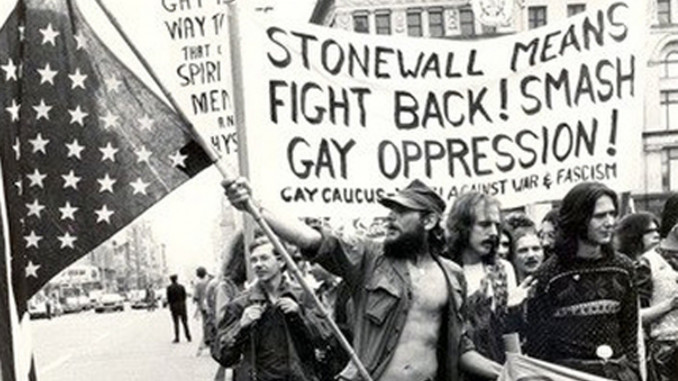
The history of LGBTQ+ rights is a history of radical resistance — but there hasn’t always been a need for LGBTQ+ people to fight back. For much of human history, there was no such thing as “being gay,” at least not in the way it is understood now. Across cultures and centuries, people lived, loved, and expressed their gender and sexuality in all kinds of ways without fear or stigma. It wasn’t until the rise of modern property relations and the spread of capitalism that queerness was carved out as a separate identity — one that could be marked as deviant, criminal, or wrong.
And today, LGBTQ+ people — especially trans people — are once again facing renewed attacks and a growing wave of anti-trans hate. That makes this a good time to look back. Because the truth is this: every right ever won was fought for by people who refused to be silent. Pride didn’t start with rainbow flags, parties, or corporate sponsorships. It started as part of a radical movement.
As long as queer people have been pushed into the closet, they have fought not just to come out, but to destroy the closet altogether. Long before Stonewall, LGBTQ+ people were organizing in the U.S. In the 1950s, at the height of McCarthyism — when queer people were being fired, arrested, and publicly outed — they organized anyway. The Mattachine Society, founded by former Communist Party members, and the Daughters of Bilitis, the first U.S. lesbian organization, came together to fight for LGBTQ+ liberation. Alongside other underground groups across the country, they built networks, published newsletters and magazines, and held secret meetings to survive and resist.
In the 1960s, as the Civil Rights Movement reshaped politics in the U.S., LGBTQ+ people began stepping into the open. The fight at the Stonewall Inn in New York City marked a pivotal moment. In 1969, during yet another police raid on a gay bar, queer and trans people — many of them Black, Brown, and unhoused — fought back. For days, crowds gathered and battled police in the streets. Decades of rage against police harassment, social violence, and systemic exclusion boiled over. It wasn’t the first uprising, and it wouldn’t be the last. But it lit a spark. The following year, people returned to the streets — not to mourn, but to march. That was the first Pride.
By the 1980s, the AIDS crisis was devastating the queer community. The government stood by while thousands died. But again, people fought back. ACT UP shut down Wall Street, occupied the Food and Drug Administration (FDA), and forced a criminally indifferent system to respond. Their militant organizing saved lives.
The struggle against the AIDS epidemic continued through the ’90s as LGBTQ+ youth began to fight for recognition and legal rights. The right to be out and open at work was contested in courtrooms and in the streets. Gay marriage was seen not just as access to legal benefits, but as a fight for recognition — for the equal treatment of LGBTQ+ people. As queer representation expanded in media and literature — giving people the mirrors they needed to see themselves and each other reflected — right-wing interests pushed back. Book bans and attacks on access to LGBTQ+ stories grew as the movement gained visibility.
Today, a new round of attacks is underway. Trump and his administration have emboldened right-wing groups and are actively targeting LGBTQ+ people, scapegoating them to channel public anger. Book bans and anti-LGBTQ+ legislation are spreading across the country. In response, LGBTQ+ people are being pushed back to the roots of the movement. Sponsored projects through colleges, NGOs, and nonprofits are drying up. The corporatization of Pride has collapsed as companies that once profited from LGBTQ+ identities in June quietly pack up their rainbows.
The struggle for queer rights must be fought by those who refuse to look away — and by building solidarity with others under attack: undocumented immigrants, people of color, women, the elderly, disabled people, and the poor.
This is the real history of Pride: not parades, but protest. Not just celebration, but struggle.




